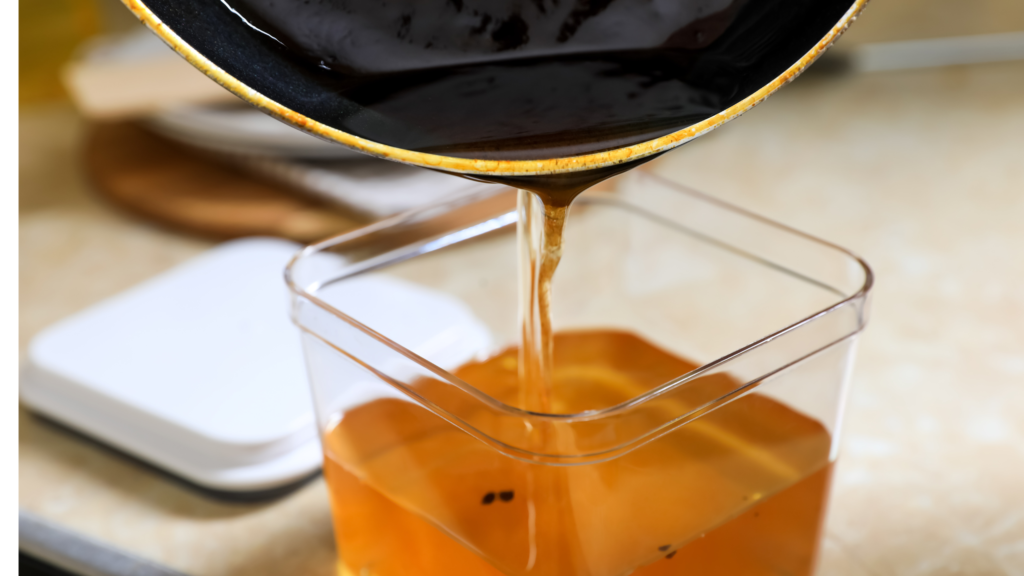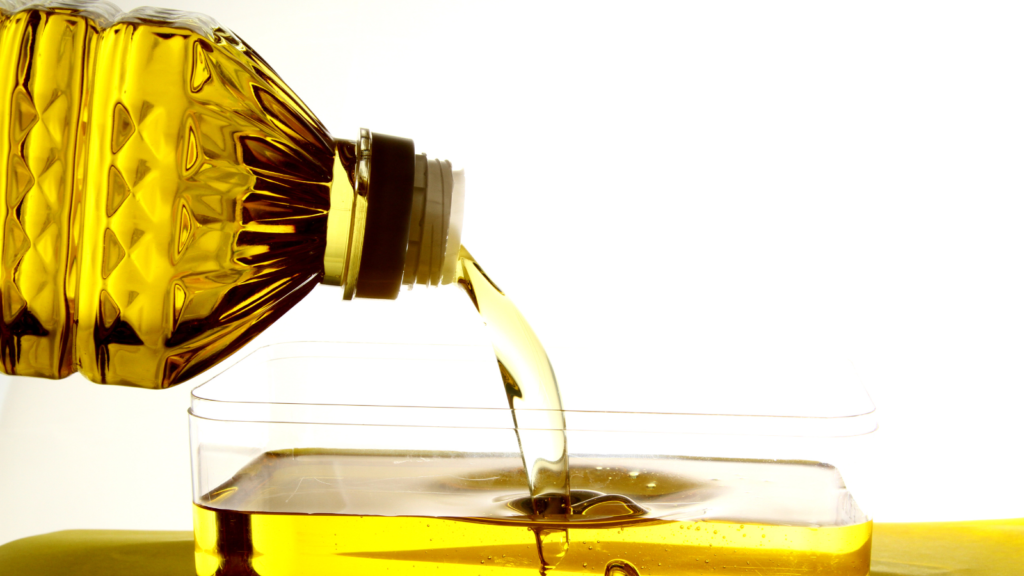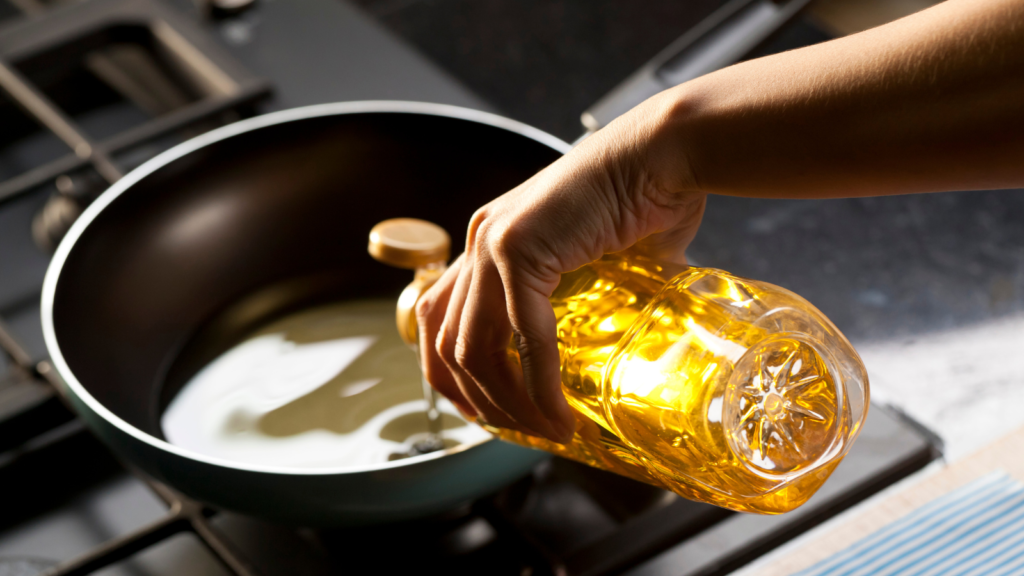Welcome to our article on the potential health risks associated with repeatedly Reheated Vegetable Oil . Many of us are unaware of the dangers that lurk in our kitchen when it comes to cooking with certain types of oils. By understanding the risks and adopting safe cooking practices, we can take proactive steps to safeguard our health.

When we repeatedly Reheated Vegetable Oil, we unknowingly expose ourselves to harmful substances that can have long-term effects on our well-being. The process of oxidation, which occurs when oils are heated to high temperatures, leads to the production of toxic compounds that can compromise our health. Therefore, being aware of the dangers and making informed choices in our cooking practices is crucial.
Key Takeaways:
- Reheating vegetable oils can pose a significant risk to our health.
- Oxidation in vegetable oils leads to the production of harmful substances.
- Understanding the risks can help us make healthier cooking choices.
- Safe reheating practices can minimize the risks associated with heated oils.
- Exploring alternative cooking methods and oils can reduce health risks.
Types of Vegetable Oils Prone to Harmful Substance Production
When it comes to Reheated Vegetable Oil , not all vegetable oils are created equal. Certain types of oils are more susceptible to producing harmful substances when subjected to high heat repeatedly. It’s essential to understand the molecular composition of these oils to grasp why they pose higher risks compared to others.
One such oil is canola oil. Canola oil contains a high percentage of omega-6 fatty acids, which are known to undergo oxidation when exposed to heat. This oxidation process can lead to the formation of harmful compounds, such as aldehydes and free radicals. These compounds have been linked to various health issues, including inflammation, oxidative stress, and even the development of chronic diseases.
ALSO LOOK : Why Drinking Tulsi Water Every Day? 5 Hidden Health Benefits You Never Knew
Another type of oil prone to harmful substance production when reheated is sunflower oil. Similar to canola oil, sunflower oil is rich in omega-6 fatty acids, making it susceptible to oxidation. The production of harmful compounds during reheating can pose risks to cardiovascular health and contribute to inflammation in the body.

Palm oil is also worth mentioning when discussing oils prone to harmful substance production. Palm oil is often used in cooking due to its stability at high temperatures. However, when repeatedly heated, palm oil can undergo oxidative changes, leading to the formation of potentially toxic compounds. These compounds may have adverse effects on health, including oxidative damage and inflammation.
Reheated Vegetable Oil : It’s essential to note that the risks associated with reheating oils are not limited to these specific types. Other oils, such as soybean oil, corn oil, and peanut oil, can also generate harmful substances under prolonged or high-temperature heating conditions. Understanding the composition and properties of the oils you use for cooking is crucial for minimizing the risks.
Table: Oils Prone to Harmful Substance Production when Reheated
| Oil Type | Main Risks |
|---|---|
| Canola Oil | Formation of aldehydes and free radicals, linked to inflammation and chronic diseases. |
| Sunflower Oil | Risks to cardiovascular health and increased inflammation due to oxidation. |
| Palm Oil | Potential formation of toxic compounds, leading to oxidative damage and inflammation. |
| Soybean Oil | Possible generation of harmful substances under prolonged or high-temperature heating. |
| Corn Oil | Risks of harmful substance production when repeatedly heated. |
| Peanut Oil | Potential formation of harmful compounds under prolonged or high-temperature heating conditions. |
By understanding the specific oils prone to harmful substance production when reheated, you can make informed choices about the oils you use in your cooking. The next section will explore strategies to minimize the risks associated with reheating vegetable oils and promote safer cooking practices.
Minimizing Risks: Safe Reheated Vegetable Oil Practices
When it comes to reheating vegetable oils, adopting safe practices is crucial to minimize the associated health risks. By following a few key guidelines, individuals can ensure healthier cooking practices and reduce the detrimental effects of reheated oils on their well-being.
1. Temperature Control
Proper temperature control is essential when reheating vegetable oils. Reheated Vegetable Oil beyond their smoke point can lead to the formation of harmful substances and oxidation, which can have adverse effects on our health. It is important to use a thermometer to monitor the temperature and avoid exceeding the recommended limits.
2. Storage Recommendations
Storing vegetable oils correctly is another crucial aspect of safe reheating practices. Oils should be stored in a cool, dark place, away from direct sunlight and heat sources. Exposure to light and heat can accelerate the oxidation process, leading to the production of harmful compounds. Additionally, it is advisable to use oils within their expiration dates to ensure their quality.
3. Avoid Repeated Reheated Vegetable Oil
Avoid repeatedly reheating vegetable oils as much as possible. Each time an oil is heated, its molecular structure changes, increasing the risk of harmful compound formation. Instead, try to use fresh oil for each cooking session to minimize the accumulation of these detrimental substances.
4. Choose Oils with Higher Smoke Points
Opting for oils with higher smoke points can also help minimize the health risks associated with reheating. Oils like avocado oil, coconut oil, or grapeseed oil have higher smoke points, making them more suitable for cooking at higher temperatures. These oils are less likely to break down and produce harmful substances when reheated.

By adopting safe reheating practices, individuals can mitigate the risks associated with Reheated Vegetable Oil and safeguard their health. Proper temperature control, storage recommendations, and making informed choices regarding oil selection are crucial steps towards maintaining a healthier cooking routine.
Alternative Cooking Methods and Oils to Reduce Health Risks
When it comes to cooking with vegetable oils, it is crucial to be aware of the potential risks involved in this common practice. The Reheated Vegetable Oil can lead to the production of harmful substances that can negatively impact our health. However, there are alternative cooking methods and oils that experts recommend to mitigate these risks and promote healthier cooking habits.
One alternative is to opt for oils with higher smoke points, such as avocado oil, coconut oil, or grapeseed oil. These oils have a higher tolerance for heat and are less likely to undergo oxidation, reducing the formation of harmful compounds. Incorporating these oils into your cooking routine can help minimize the risks associated with reheating vegetable oils.
Moreover, exploring alternative cooking techniques can also be an effective way to reduce health risks. Grilling, steaming, or baking food instead of frying can significantly lower the chances of oil reaching its smoke point and becoming potentially harmful. These methods allow you to cook food without subjecting it to excessive temperatures, preserving its flavor and nutritional value.
For those seeking non-oil-based cooking alternatives, there are various options available. Air frying has gained popularity in recent years as a healthier alternative to traditional frying. This method uses hot air circulation instead of oil to achieve crispy and delicious results. Another option is to use broth, water, or vegetable stock for sautéing and stir-frying, minimizing the need for oil altogether.
“By choosing oils with higher smoke points and exploring alternative cooking methods, we can reduce the health risks associated with cooking with vegetable oils,” says Dr. Emily Johnson, a renowned nutritionist. She emphasizes the importance of being mindful of cooking practices to prioritize our well-being.
Benefits of Alternative Cooking Methods and Oils
Integrating alternative cooking methods and oils into your culinary repertoire offers several benefits beyond the mitigation of health risks. By using oils with higher smoke points, you can achieve better cooking results with improved flavor and texture. These oils also tend to have a longer shelf life, reducing waste and saving you money in the long run.
Reheated Vegetable Oil Exploring non-oil-based cooking alternatives not only promotes healthier cooking but also opens up a world of new flavours and possibilities. Steaming vegetables, for example, helps retain their natural nutrients and vibrant colors, resulting in a more nutritious and visually appealing dish. Air-fried foods provide the satisfying crunch we love without the excess oil, allowing us to enjoy guilt-free indulgence.
In summary, the Reheated Vegetable Oil can be minimised by adopting alternative cooking methods and using oils with higher smoke points. These practices not only protect our health but also enhance our culinary experiences. By making small changes in our cooking habits, we can prioritize our well-being without sacrificing flavor or enjoyment in the kitchen.
| Alternative Cooking Methods and Oils | Smoke Point (°F) | Benefits |
|---|---|---|
| Avocado Oil | 520 | High heat tolerance, contains beneficial nutrients |
| Coconut Oil | 350 | Improves flavor, adds richness to dishes |
| Grapeseed Oil | 420 | Neutral taste, high smoke point |

Summery reviewed
Throughout this article, we have explored the impact of Reheated Vegetable Oil on our health. It is evident that reheating oils poses significant risks and consequences for our well-being.
When vegetable oils are heated to high temperatures, they undergo oxidation, leading to the formation of harmful substances that can negatively affect our health. These substances include free radicals and toxic compounds that can contribute to inflammation, cell damage, and an increased risk of chronic diseases.
It is crucial to be aware of these risks and take necessary steps to minimize their impact. By adopting safe reheating practices, such as avoiding Reheated Vegetable Oil , using oils with higher smoke points, and practicing proper temperature control, we can reduce the formation of harmful substances and safeguard our health.
Furthermore, considering alternative cooking methods like steaming, baking, or stir-frying, as well as exploring non-oil-based cooking alternatives, can also help reduce our exposure to the risks associated with heated vegetable oils.
FAQs
Why is Reheated Vegetable Oil putting my health at risk?
Reheated Vegetable Oil can lead to the production of harmful substances. When oils are heated above their smoke point, they undergo a process called oxidation, which can result in the formation of toxic compounds. Consuming these oxidized oils regularly has been linked to various health issues.
What are the dangers of reheating oils?
Reheated Vegetable Oil can lead to the production of harmful substances such as free radicals and trans fats. These substances have been associated with increased inflammation, oxidative stress, and an elevated risk of chronic diseases, including heart disease, cancer, and diabetes.
How does vegetable oil oxidation impact my health?
When vegetable oils are repeatedly heated, their structure breaks down, leading to oxidation. Oxidized oils contain harmful compounds that can cause cellular damage, promote inflammation, and contribute to the development of chronic diseases. It is important to minimize the consumption of oxidized oils for optimal health.
Which types of vegetable oils are more prone to harmful substance production when heated?
Reheated Vegetable Oil which is Certain types of vegetable oils, such as soybean oil, canola oil, and corn oil, are more prone to producing harmful substances when heated. These oils have lower smoke points and higher levels of polyunsaturated fats, making them more susceptible to oxidative damage and the formation of toxic compounds.
What are the harmful effects of Reheated Vegetable Oil ?
Consuming heated oils can lead to an increased risk of inflammation, oxidative stress, and chronic diseases. The harmful effects may include cellular damage, impaired immune function, accelerated aging, elevated cholesterol levels, and an increased risk of cardiovascular problems and certain cancers.
What safe practices can individuals adopt to minimize the risks associated with Reheated Vegetable Oil ?
To minimize the risks, it is recommended to avoid reheating oils excessively. Use lower cooking temperatures and shorter cooking times. Store oils properly in a cool, dark place away from direct sunlight and sources of heat. Additionally, Reheated Vegetable Oil avoid reusing oils multiple times to reduce their exposure to heat and oxidation.
Are there alternative cooking methods or oils that experts recommend to reduce health risks?
Yes, experts recommend using oils with higher smoke points, such as avocado oil, coconut oil, or ghee, as they are more stable at high temperatures. Alternative cooking methods like baking, steaming, or stir-frying can also help reduce the risks associated with reheating vegetable oils.





